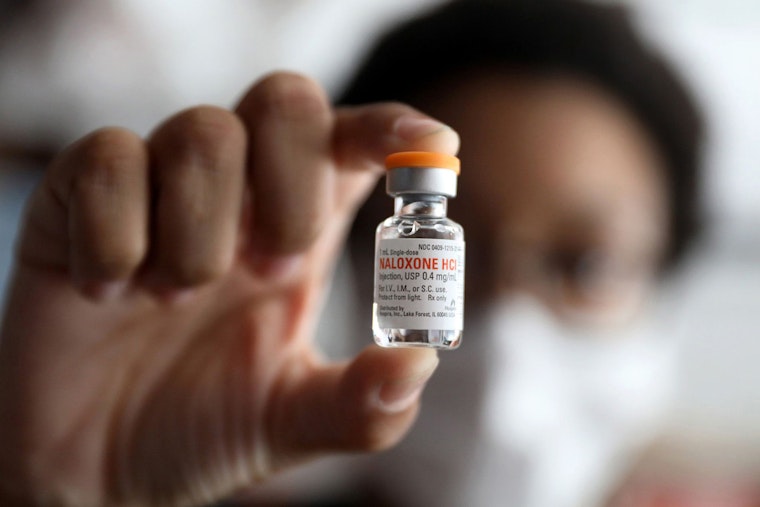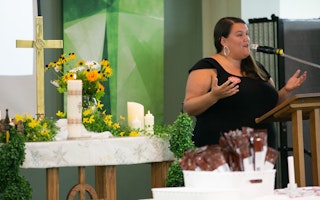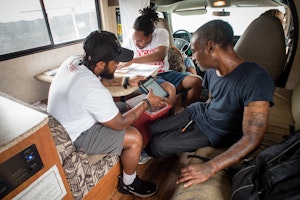The Prescription for Saving Lives
By Maya Doe-Simkins & Eliza Wheeler

This month, the United States will surpass a once-unimaginable milestone: more than 100,000 people have died of an overdose in the past year, the most ever recorded. In the midst of this crisis, harm reduction programs are preventing even more overdose deaths by making available the easy-to-use antidote naloxone to people who use drugs.
Naloxone seems like a miracle drug in many ways. It is an extremely safe medication. It restores breathing to those experiencing opioid overdose, but if someone were to give it even if the person wasn’t overdosing, it would do no harm. And, it’s easy for people who use drugs to learn how to use it.
Yet, there is currently a shortage of the affordable version of this lifesaving medication.
For the past decade, our volunteer-run organization, the Remedy Alliance (also called the Opioid Safety and Naloxone Network Buyers Club), has ensured that people most likely to witness an overdose have the antidote on hand. The market price for naloxone ($75 at the “public interest price” for nonprofits for a two-pack of nasal Narcan, or about $30 for two doses of injectable naloxone) is simply too high to match the need. So, we negotiated a deal with Pfizer for member harm reduction programs to be able to purchase naloxone for less than $5, plus additional costs for packaging and distribution (around $10 each). By 2014, harm reduction programs in our Buyers Club had recorded more than 26,000 overdoses reversed, almost certainly an undercount.
Meanwhile, the need for naloxone has only grown. The U.S. drug supply increasingly contains unpredictable fentanyl analogues and other complicating additives, increasing the risk of overdose and other complications for people who use drugs. COVID-19 drove a further surge in overdose rates, now growing fastest among Black, Latino, and Indigenous communities. COVID-19 and the overdose crisis have combined to create a multiplier effect in Black, Indigenous, and people of color communities, which threatens to undermine decades of work towards achieving greater health equity.
Today, more than 100 community organizations are Buyers Club members, and naloxone purchased through our organization accounts for a large portion of the entire country’s community-based distribution.
But suddenly in April, production of the naloxone we rely on came to a standstill when Pfizer experienced manufacturing problems and no other manufacturer was willing to sell us affordable naloxone. Emergent BioSolutions, the makers of nasal Narcan, actually laughed at us when we requested donated product to address the need. We estimate that the current shortage could result in 12,000 to 18,000 additional deaths.
At every turn, we face unnecessary logistical hurdles as we attempt to get this medicine to those in a position to save lives. There are a thousand ways to say “no” to improving access to naloxone. For example, a public health program in Michigan recently purchased 15 vending machines in an innovative attempt to provide free naloxone around the clock in areas with many overdoses and few services. Despite a statewide standing order making naloxone available to people at risk of overdose without an individual prescription, overly conservative interpretations of allowable distribution methods and fear of Food and Drug Administration enforcement made it hard to find locations willing to host the machines.
Elsewhere, the Northwest Portland Area Indian Health Board serves 43 tribes in Washington, Oregon, and Idaho. These rural and remote Native American communities have limited emergency medical care, and no access to in-person harm reduction services. While the organization can purchase naloxone, their legal team prohibits them from mailing it across state lines because of its prescription-only status.
It doesn’t need to be this way. COVID-19 has shown us that when the political will is there, solutions follow. By recognizing overdose as the public health emergency that it is, the federal government could issue a compulsory license for the patented nasal naloxone. This would allow generic manufacturers to produce and sell nasal naloxone at a lower cost, and the nation’s frontline programs wouldn’t be dependent on the goodwill of one pharmaceutical company.
The Food and Drug Administration could remove the prescription designation and make both nasal and injectable naloxone available over the counter. The Food and Drug Administration has new authority under the 2020 CARES Act to initiate this process. Yet the agency has prioritized wart removers, ingrown toenail treatments, and anti-flatulent medications.
State and federal governments could ensure that overdose prevention funds are directed to syringe service programs that reach the most important target group: people who use drugs. These government actions would make naloxone more accessible to individuals and programs serving rural communities, Black, Indigenous, and people of color populations, and those most marginalized from mainstream healthcare services. Just as we’ve learned with the struggle for vaccine equity, we cannot rely on the benevolence of pharma to reach those most in need.
It was an act of love when people who use drugs first liberated naloxone from the medical establishment and began giving it to their peers. But there is still more to be done to fully realize this vision. With a person dying every five minutes in the U.S. from overdose, we can no longer allow bureaucratic hurdles to stand in the way of action. With the media and decision makers finally paying attention, we will keep up the pressure until the federal government does its part to remove barriers, and state and local governments ensure that critical funding prioritizes community programs directly serving people who use drugs.
Remedy Alliance is a grantee of the Open Society Foundations.
Maya Doe-Simkins is co-director of Remedy Alliance.
Eliza Wheeler is co-director of Remedy Alliance.

